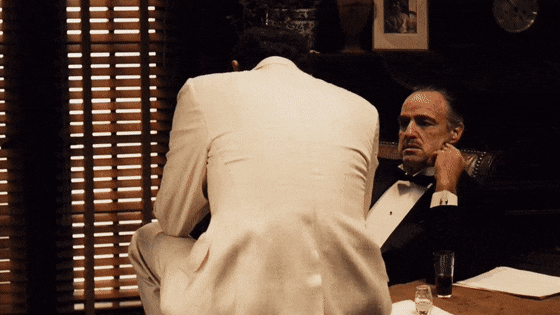I’ve struggled a bit with the vocabulary here. “Analog” doesn’t quite capture it. But it’s close. A couple decades ago I might have used the word “meme”. But with the rise of the Internet that word has now taken on a very particular meaning which is distinct from what I’m talking about. For me, and I suspect for you, there are certain movies – perhaps also TV shows or novels – which contain certain iconic or resonant moments that not only stick with us but then provide analogs which shape our understanding of real life moments. They also allow us to communicate our perceptions of those moments to others through this visual or analogic shorthand.
There’s a lot going on in that sentence so let me provide an example. For me one of those movies is The Godfather (really the whole trilogy). There’s Michael telling Sen. Geary his offer is “nothing.” There’s Vito Corleone dressing down the undertaker Amerigo Bonasera and then accepting his offer of “friendship.” Particularly Godfather I and II have countless exchanges and plot twists like this. They are mostly about the economy of power and how it interacts with friendship and loyalty.

For people who have a relationship with those movies you’re frequently either thinking or telling others … well, this is like that scene or when that happened. In the old days we might have referenced a quote or brief description. But this referential communication has taken on a visible and visual life through social media with short gifs or video clips that people use as a shorthand to characterize some event.

If you’re a Star Trek fan you may remember an episode from the fifth season of Star Trek: The Next Generation called “Darmok.” Without going too deep into the plot the episode turns on a race of aliens (the Tamarians) who communicate only through analogs, something close to what I am describing here. In that story the referents come not from movies but what appears to be the species’ mythological stories or mythologized history. There’s “Shaka, when the walls fell” which means failure. Or “Darmok and Jalad at Tanagra” which means cooperation.
But of course there’s more there than a simple meaning. When I reference Michael Corleone’s interchange with Senator Geary I’m referencing much more than what amounts to his “no” or “I won’t negotiate.” There’s a whole world of meaning about power, the fictive world of political power versus the real power that Michael wields. It communicates the predatory, carnivorous sort of power by domination Michael holds and the person he has become since we first met him in the first episode in the trilogy. There’s a similar depth of meaning in the mythological world the Tamarians reference.
The episode is one of the most remembered for fans of the series but it poses a number of really fascinating, complicated questions about speech, language and how we understand the world – ones that are only hinted at but not fully explored in the forty-odd minutes of the episode itself. Indeed, almost a quarter century after the episode debuted in 1991 The Atlantic was publishing this lengthy and challenging Ian Bogost article on the episode and the complexities of language and ideation it raises. Are these analogs or metaphors of allegories? Typologies? And what difference does it make to how we understand language which one it is?
Biblical religions have something quite similar to this in the way they use foundational events or moments in the biblical texts as pedagogical or rhetorical analogs through which to understand events we encounter in our lives. The hero Jacob cheating his brother Esau of his birthright. Nicodemus visiting Jesus under the cover of darkness. Islam is perhaps even more analogical in the way that the stories about Muhammad’s life are preserved as guides to the proper way to live life for observant Muslims.
I mentioned earlier that this kind of analogical thinking or communication by reference using movies has taken on an expanded life in the Internet and social media eras. Before the social media era I could describe a cinematic moment. Now I can show it to you effortlessly in a brief video clip. It’s not just supply but demand too. There is such a profusion of information, making attention such a scarce commodity, that there is a greater need, a deeper impulse to communicate through these touchstone analogs. If you and I know the same movie and I want to explain or characterize a particular current event through one of these iconic moments I can communicate almost a world of information, context, meaning not only in few words but perhaps in no words at all. I just share a gif or an image. In my own experience, direct and vicarious, this continues to become more common. It’s ubiquitous in social media contexts and this ubiquity has expanded beyond social media to colonize other realms of communication. I have witnessed and even participated in whole conversations that turn mostly on such analogical references.
For me, the movies that play this role are The Godfather trilogy, Spinal Tap and perhaps also Goodfellas. The Godfather movies seem to have an outsize role in this analogical world. Particularly for men.
In the 1998 romantic comedy You’ve Got Mail, the Meg Ryan character (Kathleen Kelly) asks Tom Hanks (Joe Fox) …
What is it with men and The Godfather?
JOE (V.O.)
The Godfather is the I Ching. The
Godfather is the sum of all wisdom. The
Godfather is the answer to any question.
What should I pack for my summer
vacation? “Leave the gun, take the
cannoli.” What day of the week is it?
“Maunday, Tuesday, Thursday, Wednesday.”
And the answer to your question is “Go to
the mattresses.”
(continued)CAMERA ON KATHLEEN – CONSIDERING WHAT HE SAYS
JOE (cont’d)
You’re at war. “It’s not personal, it’s
business. It’s not personal it’s
business.” Recite that to yourself every
time you feel you’re losing your nerve.
I know you worry about being brave, this
is your chance. Fight. Fight to the
death.
This isn’t quite the same as the analogical communication I’m describing. But it’s close. Indeed, what the Hanks character is describing is a way of communicating with oneself by way of grounding analogs that help us make decisions. It’s not that different.
What we can see is that one’s analogical touch points – what movies or other narrative art forms play this role for you – tell us things about you and place you within communities of representation and understanding. I have countless movies that play this role for me but choosing these three as references pretty clearly places me as an American man born sometime in the second half of the twentieth century. The focus on mafia dramas also likely ties to a life spent thinking about the power dynamics of political life.
Different demographic groups have different analogical touch points that define them and their thinking. It also shapes that thinking. But one of the most interesting – to me at least novel – features of contemporary digital life on social media is that many of these referents take on a life beyond their individual reception. People use these referents or analogs to describe or communicate ideas even when they’ve never seen the original movie or TV show or whatever it came from. Through repeated use certain referents become widely intelligible and understood. There’s a proto-language of memes and analogs cut free from knowledge of the individual referents or having seen the moving or read the books. We’re a few steps to being Tamarians, at least online.
With all that, what is your top analog movie?






